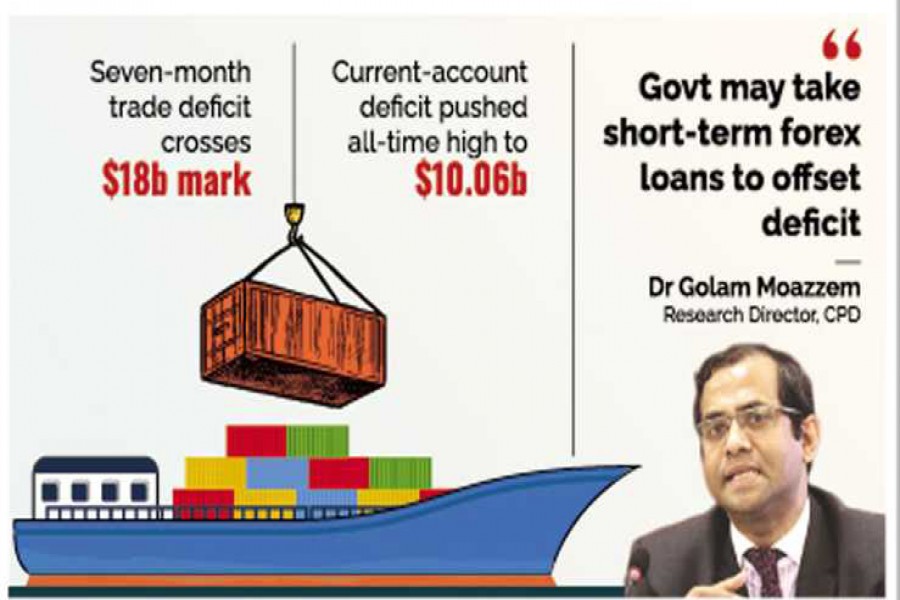
Published :
Updated :

Bangladesh's overall trade deficit crossed US$18-billion mark in the first seven months of the current fiscal year, burning a gaping hole in the country's current-account coffer.
Deficits in both the accounts go widening as higher import payments far outstrip export earnings and remittance also slows, official data show, thus putting pressure on the economy.
And the higher trade deficit along with lower inflow of remittances pushed up the country's current-account deficit to an "all-time high" at $10.06 billion during the period under review, officials say.

The trade gap with the rest of the world increased over 82 per cent or $8.43 billion to $18.69 billion during the July-January period of FY 2021-22, from $10.27 billion in the same period of FY'21, according to the central bank's latest statistics.
During the period, import expenses ballooned more than 46 per cent while export earnings recorded a 29.23-per cent growth.
The overall import cost stood at $46.67 billion in the July-January period against $31.92 billion in the same period a year before while export earnings rose to $27.98 billion from $21.65 billion.
"It's a temporary phenomenon," a senior official of the Bangladesh Bank (BB) told the FE while explaining the latest trend in foreign trade of Bangladesh. "We've to wait a couple of months to come back in pre-covid-19 level."
Actually, the foreign trade, covering import and export, increased significantly during the period under review amid gradual reopening of economic activities-both domestic and global-after more than one year of pandemic pause.
Besides, higher prices of essential commodities, including fuel oils, on the global market also pushed up the country's import payments during the period, according to the officials.
Talking to the FE, Khondaker Golam Moazzem, research director of the Centre for Policy Dialogue (CPD), said the country's overall trade deficit could widen further in the coming months because of the rising trend in prices of commodities, including petroleum products, on the international market.
Dr Moazzem suggests that the central bank should strengthen intervention into the country's foreign-exchange market through selling the US dollar to banks directly to help keep the market stable.
The central bank has so far sold $3.38 billion from the reserves direct to the commercial banks as liquidity support for settling their import- payment obligations in FY '22.
"Depreciating mode of the Bangladesh Taka (BDT) against the US currency has pushed up import expenses in the recent months," the senior economist notes.
He also says the government may avail short-term foreign-currency loans from development partners for settling its import-payment obligations for essentials that will also help ease the pressure on the market.
Meanwhile, the country's current-account deficit also exceeded $10-billion mark during the period under review following higher import payments alongside lower inflow of remittances.
The current-account deficit rose to $10.06 billion during the July-January period of FY'22 from $8.18 billion a month ago. It was $1.56 billion surplus in same period of FY'21.
Inward remittances dropped by nearly 20 per cent to $11.94 billion in the first seven months of FY'22 from $14.91 billion in the same period of FY'21, the BB data show.
Experts, however, predict that the ongoing upturn in the current-account deficit may continue in the coming months if the lower inflow of remittances and higher import expenses persist.
They also say pressure on exchange rate may increase in the coming months if the upward trend in current-account deficit continues.
However, the financial account's surplus improved further following higher inflows of medium-and long-term loans as well as aid flows, according to the BB officials.
The financial account's surplus rose to $8.16 billion during the July-January period of FY'22 from $4.46 billion in the same period of the last fiscal year.
Actually, the soaring deficits in trade as well as the current account reflect the growing imbalance on the external front, thus creating mounting pressure on the country's overall balance of payments (BoP).
The BB data show that the BoP posted a negative balance of $2.05 billion in the first seven months of FY'22 against a positive balance of $6.41 billion in the same period of FY'21.
Talking to the FE, another BB senior official said the country's external sector is now under pressure following higher trade deficit.
Besides, geopolitical tensions along with rising prices of commodities, including fuel oils, on the global market also push up pressure on the external sector, the central banker explained.
siddique.islam@gmail.com


 For all latest news, follow The Financial Express Google News channel.
For all latest news, follow The Financial Express Google News channel.